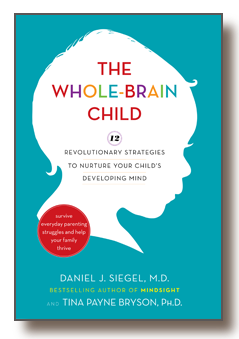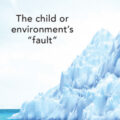 This book, by Daniel Siegel, MD, and Tina Payne Bryson, Ph.D, is a gem of a book I would recommend every parent have as a resource. The 12 strategies are clearly explained with concrete examples and delightful cartoons. One story describes how to help Marco, a two-year old who has been involved in a car accident with his babysitter, process and make sense out of what has happened. He repeatedly says “Eea woo woo.” “Eea” is his word for “Sophia”, his babysitter, and “woo woo” refers to the noise of a siren. The authors describe in detail how to help Marco tell his story, makes sense out of it, and put it in perspective so his brain can process the frightening experience and enable him to be able to go on with his daily routines in a healthy and balanced way. Get this book or work with me to learn how.
This book, by Daniel Siegel, MD, and Tina Payne Bryson, Ph.D, is a gem of a book I would recommend every parent have as a resource. The 12 strategies are clearly explained with concrete examples and delightful cartoons. One story describes how to help Marco, a two-year old who has been involved in a car accident with his babysitter, process and make sense out of what has happened. He repeatedly says “Eea woo woo.” “Eea” is his word for “Sophia”, his babysitter, and “woo woo” refers to the noise of a siren. The authors describe in detail how to help Marco tell his story, makes sense out of it, and put it in perspective so his brain can process the frightening experience and enable him to be able to go on with his daily routines in a healthy and balanced way. Get this book or work with me to learn how.
This is how it is described on Amazon.com:
“In this pioneering, practical book, Daniel J. Siegel, neuropsychiatrist and author of the bestselling Mindsight, and parenting expert Tina Payne Bryson offer a revolutionary approach to child rearing with twelve key strategies that foster healthy brain development, leading to calmer, happier children. The authors explain—and make accessible—the new science of how a child’s brain is wired and how it matures. The “upstairs brain,” which makes decisions and balances emotions, is under construction until the mid-twenties. And especially in young children, the right brain and its emotions tend to rule over the logic of the left brain. No wonder kids throw tantrums, fight, or sulk in silence. By applying these discoveries to everyday parenting, you can turn any outburst, argument, or fear into a chance to integrate your child’s brain and foster vital growth.
“Complete with age-appropriate strategies for dealing with day-to-day struggles and illustrations that will help you explain these concepts to your child, The Whole-Brain Child shows you how to cultivate healthy emotional and intellectual development so that your children can lead balanced, meaningful, and connected lives.”
